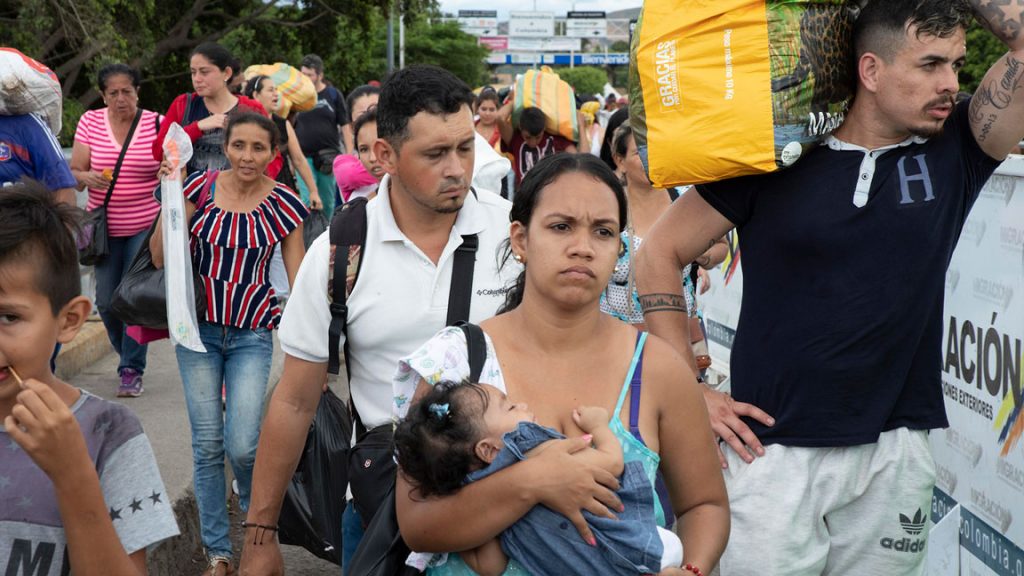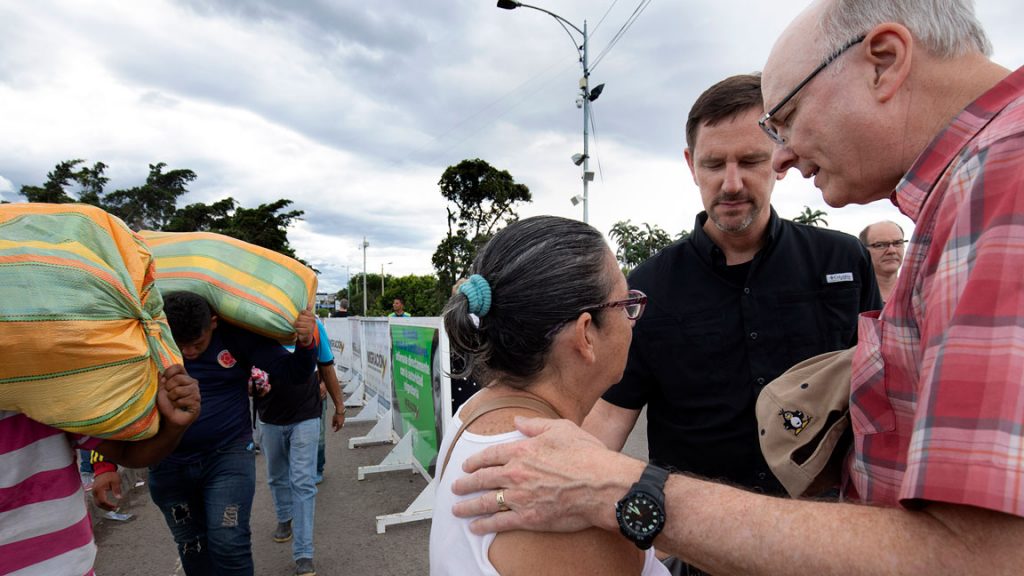“There’s no hope! There’s no life! We have no hope!”

Thousands of people from Venezuela cross into Colombia to secure whatever they can carry in their hands or on their backs before making the long journey back home. Venezuela has lost electricity and gas, the currency has been devalued to the point of being completely useless, food isn’t easily available, and health care is nonexistent. Many are crossing into Colombia, leaving behind the only home they have ever known. (IMB Photo by Chris Carter)
With tears streaming down her face, an elderly woman stood before me half way across the Simon Bolivar International Bridge between Colombia and Venezuela. She was one of thousands to cross the bridge on foot that day. Most carried food, medicine, and other essential items. They came to Colombia to secure whatever they could carry in their hands or on their backs before making the long journey back home.
Others had no plans to return. Instead, they were already miles deep in the Colombian mountains with hopes of making their way to other South American countries. They had heard there were places where refugees are welcome, jobs are available, and a better life awaits.
As I listened to the woman and many others on the bridge share their stories, their faces were marked by pain and fear. Electricity has been shut off in much of their country. Schools in some communities are closed. One person told of hospital rooms where bags of trash cover the floor.
In the wake of a collapsed economy, bartering goods has become the only way to obtain basic necessities. Venezuelan currency is more valuable as notepaper than as money to make purchases. One traveler held out a handbag that I realized, on closer inspection, was constructed entirely from Venezuelan bills.
Millions have fled the country. But many of the poor who take flight find survival outside of Venezuela every bit as challenging as life inside Venezuela.
At a roadside shelter where Southern Baptists partner with relief agencies to provide meals, showers, and warm clothing, we met a man, a construction worker by trade, on his way back to Venezuela. He had crossed Berlin Mountain twice.

IMB President Paul Chitwood and missionary leader Charles Clark pray for a Venezuelan woman halfway across the Simon Bolivar International Bridge between Colombia and Venezuela as people pass by carrying food. The woman had crossed into Colombia to buy basic necessities that are no longer available in Venezuela. (IMB Photo by Chris Carter)
At an elevation of more than 10,000 feet, where temperatures regularly drop below freezing, Berlin Mountain is one of the many perils that await the refugees. After his first crossing, this man had traveled for weeks to a place he was sure he could earn money to send to his wife and children back home. But he soon learned the job market was already flooded by those who had arrived before him. Without paperwork, he was sure to starve. What few possessions he carried on his hopeful journey out of Venezuela had been stolen. His only option was to go back.
He had nothing in his hands, but the weight of his failure was crushing him. The man’s ragged clothes and quivering lip told the story: “There’s no hope! There’s no life! We have no hope!”
At another roadside stop, I met a woman who had deserted the Venezuelan army. She did not have the heart to do what soldiers were directed to do in response to the conflict. But now, with her children stuck in Venezuela in the care of her mother, her pain and grief seemed more than she could bear. She volunteered in a little market to serve other refugees. Above her head and on the walls were hundreds of notes, each telling a part of the painful story of those who journeyed through: “There’s no hope! There’s no life! We have no hope!” the notes read.
But there is hope.
Standing alongside me on the bridge were hope-givers. At the roadside shelter where we partner with relief agencies were hope-givers. And at the little market where we stopped were hope-givers. Some were your Southern Baptist missionaries. Others were Colombian and Venezuelan Baptist pastors and missionaries — the spiritual children and grandchildren of those who heard the gospel as a result of Southern Baptist mission work in Colombia and Venezuela dating back to the 1940s and 1950s. Some were the next generation of Venezuelan church planters in one-year training, much of it revolving around ministry to refugees.
All of these hope-givers have heard and believed the gospel and committed their lives to sharing it. The impact they are having upon those left hopeless by the circumstances of their life and country is powerful and instantaneous.
On the bridge, a smile broke across the weary, tear-stained face of the elderly woman as her arms opened for an embrace. The construction worker’s burden of failure seemed to lighten. He, too, leaned forward for an embrace. The military deserter wiped away her tears and smiled as she hugged each of us. Only a few of their immediate problems were solved as they received a sandwich, a shower, a sweater. But they had been given hope.
And they heard that in Christ, there is always hope, always life, always hope. Thank you, Southern Baptists, for sharing life-giving hope with the hurting of Venezuela.





